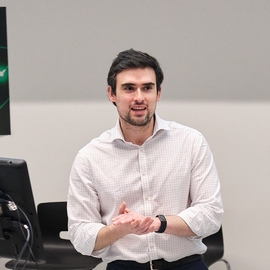Abstract
A data-driven MPC scheme is proposed to safely control constrained stochastic linear systems using distributionally robust optimization. Distributionally robust constraints based on the Wasserstein metric are imposed to bound the state constraint violations in the presence of process disturbance. A feedback control law is solved to guarantee that the predicted states comply with constraints. The stochastic constraints are satisfied with regard to the worst-case distribution within the Wasserstein ball centered at their discrete empirical probability distribution. The resulting distributionally robust MPC framework is computationally tractable and efficient, as well as recursively feasible. The innovation of this approach is that all the information about the uncertainty can be determined empirically from the data. The effectiveness of the proposed scheme is demonstrated through numerical case studies.

Postdoctoral Researcher at University of Warwick, former PhD student at OptiML (2021-2025)
Zhengang is a PhD candidate at Imperial College London. His PhD research is about data-driven distributionally robust model predictive control.Prior to his PhD research, he holds a Diplom-Ingenieur in Mechatronics from Technische Universität Dresden. His research interests include data-driven optimal control, scientific machine learning, and distributionally robust optimisation.

Principal Investigator of OptiML
Antonio del Rio Chanona is the head of the Optimisation and Machine Learning for Process Systems Engineering group based in thee Department of Chemical Engineering, as well as the Centre for Process Systems Engineering at Imperial College London. His work is at the forefront of integrating advanced computer algorithms from optimization, machine learning, and reinforcement learning into engineering systems, with a particular focus on bioprocess control, optimization, and scale-up. Dr. del Rio Chanona earned his PhD from the Department of Chemical Engineering and Biotechnology at the University of Cambridge, where his outstanding research earned him the prestigious Danckwerts-Pergamon award for the best PhD dissertation of 2017. He completed his undergraduate studies at the National Autonomous University of Mexico (UNAM), which laid the foundation for his expertise in engineering.